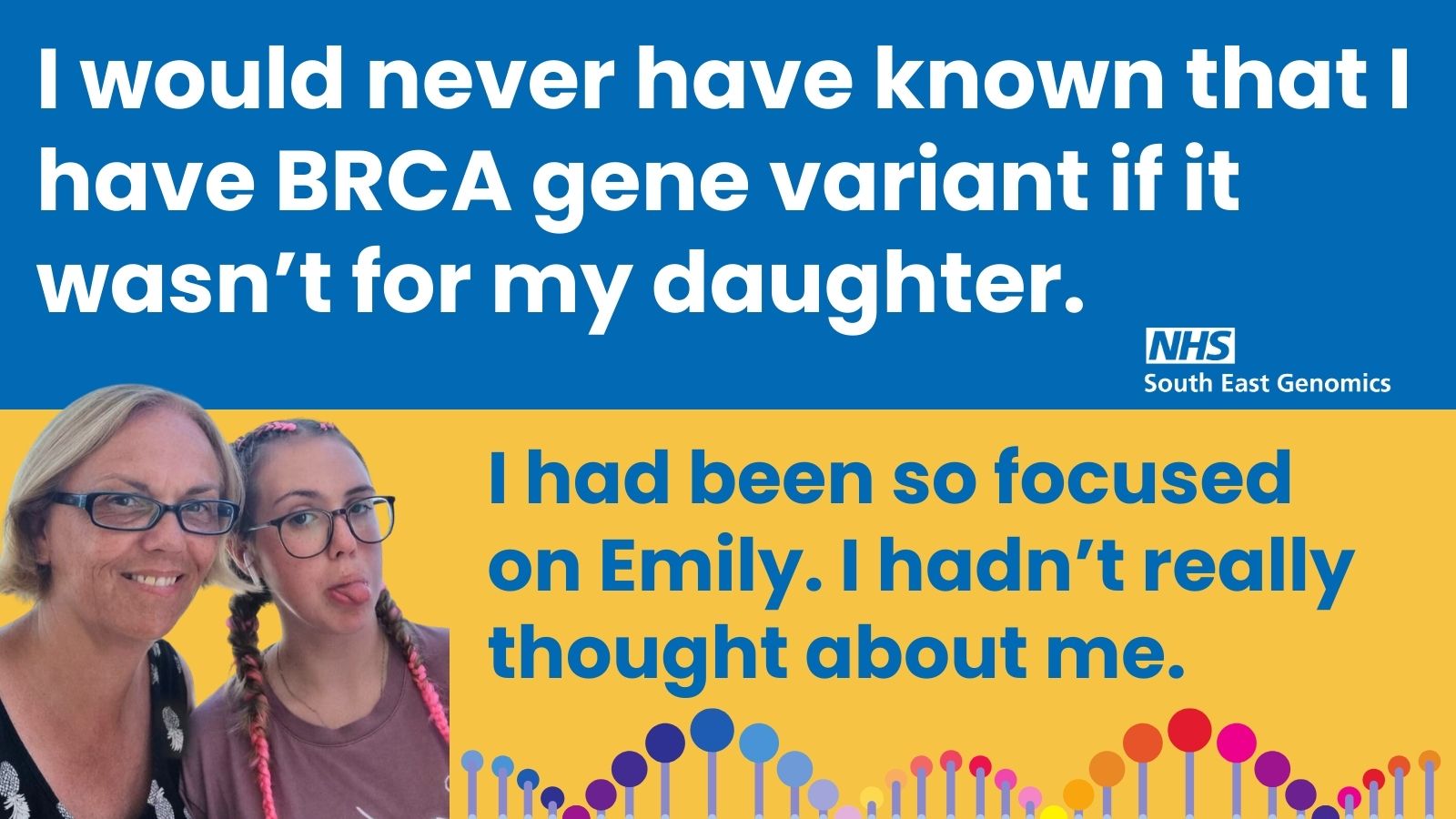
Lisa first heard about genomics thanks to her daughter, Emily. Emily has a rare form of cerebral palsy called Worcester Syndrome and it was suggested to the family that they could have their whole genome sequenced as part of the national 100,000 Genome Project.
Emily, and both her parents, decided to go ahead with the test to see if it would uncover anything useful in their genome which could then help manage her condition, or answer some of their questions about the causes of her condition.
“We had all the paperwork and we ticked the box to say that we wanted to be informed if the test uncovered any other conditions. We didn’t really think much about it. We sent off the blood sample and then forgot about it.”
Although the results didn’t find anything of use for Emily, it did show that Lisa had the BRCA gene which can increase her risk of developing cancers such as breast and ovarian cancer.
“It came as a real shock as I had been so focused on Emily. I hadn’t really thought about me.”
Lisa is an Occupational Therapist and has worked with cancer patients for many years.
“It was strange to be a patient after all my years working in healthcare, but I knew that I wanted to take control and have preventative surgery to reduce my risk of developing cancer.”
Lisa is a full-time carer for her daughter so she needed to plan her surgery around Emily’s needs. She had her Fallopian tubes and ovaries removed last year and is planning a double mastectomy next year when Emily will be a bit more independent. In the meantime, she is having an annual mammogram and MRI scans.
Since she got the results, Lisa has been reflecting on the news. “It was a real shock to find out I had the BRCA gene. I had no idea. However, since then I’ve found out that my Mum might have known that she too had the BRCA gene but me and my sister were never tested.”
Lisa’s news opens up the option for other members of her family to get tested.
Her son, Thomas, and her Dad are both getting tested. Emily isn’t yet old enough, but she has already decided that she wants to get tested in the future.
Both Lisa’s sisters have been tested, with one discovering that she too has the BRCA gene. This news meant that her sister who is 43, was able to have a mammogram which picked up a very small lump. Without the early detection, this could have been a very different story.
I feel in control now.
“If we hadn’t been offered Whole Genome Sequencing for Emily, then my family would never have found out about the BRCA gene. Now thanks to this knowledge we have the opportunity to take control of the situation for our future.”
I didn’t tell my friends to begin with, but I found a new group of women to talk to.
“I was introduced by my nurse to a support group called BRCA Kent. I chatted to Liz from the group on the phone and she encouraged me to join the group one evening. I was a bit unsure, but I went anyway and felt very welcomed. I hadn’t told any of my friends at that point, but here was a group of women who understood exactly what I was going through. Now my sister is also a member.”
Genetic testing is supported by the South East NHS Genomic Medicine Service which covers Kent, Medway, Sussex, Surrey and South London. Our role is to embed genomics and genetic testing into routine NHS care and ensure everyone can benefit from the new research and technology that is now available.
Lisa and her sister both carry the BRCA gene which can increase their risk of developing cancer. Only 10% of breast cancer cases, as well as other cancers such as ovarian and bowel cancer, are caused by an inherited gene.
If people have a strong family history where there are multiple cases of early onset breast or ovarian cancer, then they may benefit from genetic testing. However, if there is no evidence of cancer in the family, then there is no need to have a genetic test.
For people who have the BRCA gene, or other risk increasing genetic changes, then other family members can be offered a predictive genetic test to determine their risk.
The 100,000 Genome Project was an NHS initiative to sequence 100,000 genomes to help researchers understand the role our genes play in health and disease. 85,000 people were involved in this landmark study in 2018.
